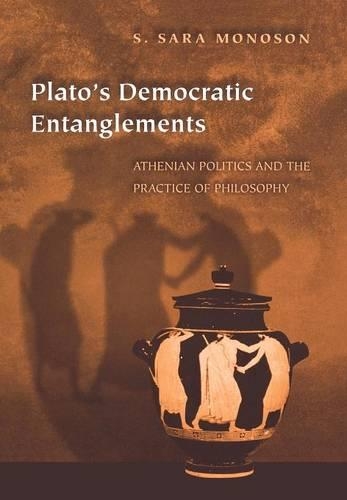
Plato's Democratic Entanglements: Athenian Politics and the Practice of Philosophy
(Hardback)
Available Formats
Publishing Details
Plato's Democratic Entanglements: Athenian Politics and the Practice of Philosophy
By (Author) S. Sara Monoson
Princeton University Press
Princeton University Press
8th August 2000
United States
Classifications
Tertiary Education
Non Fiction
Political structures / systems: democracy
184
Physical Properties
Hardback
256
Width 152mm, Height 235mm
510g
Description
In this book, Sara Monoson challenges the longstanding and widely held view that Plato is a virulent opponent of all things democratic. She does not, however, offer in its place the equally mistaken idea that he is somehow a partisan of democracy. Instead, she argues that we should attend more closely to Plato's suggestion that democracy is horrifying and exciting, and she seeks to explain why he found it morally and politically intriguing. Monoson focuses on Plato's engagement with democracy as he knew it: a cluster of cultural practices that reach into private and public life, as well as a set of governing institutions. She proposes that while Plato charts tensions between the claims of democratic legitimacy and philosophical truth, he also exhibits a striking attraction to four practices central to Athenian democratic politics: intense antityrantism, frank speaking, public funeral oratory, and theater-going. By juxtaposing detailed examination of these aspects of Athenian democracy with analysis of the figurative language, dramatic structure, and arguments of the dialogues, she shows that Plato systematically links democratic ideals and activities to philosophic labor. Monoson finds that Plato's political thought exposes intimate connections between Athenian democratic politics and the practice of philosophy. Situating Plato's political thought in the context of the Athenian democratic imaginary, Monoson develops a new, textured way of thinking of the relationship between Plato's thought and the politics of his city.
Reviews
Winner of the 2001 American Political Science Association's Best First Book Award, Foundations of Political Theory Section "Sara Monoson is that rare exception to the rule that political theorists cannot sustain the interest of political philosophers: her training in ancient history and classical Greek give her treatment of Plato's complicated relationship to democracy a depth and richness that will repay the efforts of the most exacting of critics."--Debra Nails, Journal of the History of Philosophy "No one interested in Plato and Athenian democracy or in Plato generally can afford to miss this serious study of Plato's political philosophy in relation to Athenian democracy."--F. Rosen, Political Studies "Clearly written, wide-ranging, but tightly organized. [Monoson] wears her erudition lightly, commanding a clear and cogent prose that is a pleasure to read... Her richly textured portrait of Athenian political culture requires that we reexamine the contrasts conventionally associated with 'ancient' versus 'modern democracy.' Her work also invites us to think harder about the practices through which ideals of freedom and equality may be realized."--Morris B. Kaplan, Political Theory "One of the many strengths of S. Sara Monoson's book about Plato's views on democracy ... is the frank recognition of the open-endedness of Platonic interpretation. Her aim is not to argue for a particular cut-and-dried version of Plato's thoughts about democracy but rather to add new dimensions to what is conceded to be a rich cluster of subtle and ambivalent attitudes ... All those working on either Plato or Athenian democracy will find much of interest."--Richard Mulgan, Ethics
Author Bio
S. Sara Monoson is Associate Professor of Political Science and Classics at Northwestern University.
